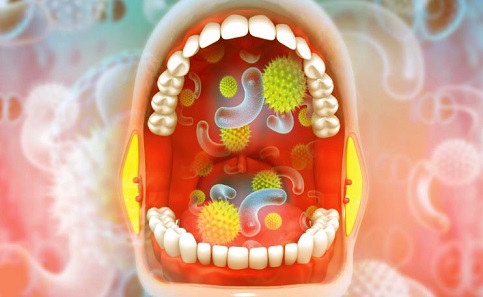Individuals with Long COVID after Omicron infection show altered oral microbiota
Nikhil Prasad Fact checked by:Thailand Medical News Team Aug 15, 2024 7 months, 4 weeks, 20 hours, 29 minutes ago
Medical News:
Understanding Long COVID and Oral Microbiota
Long COVID, a term that has become familiar to many during the pandemic, refers to a condition where individuals continue to experience symptoms long after recovering from the initial SARS-CoV-2 infection. For some, this condition persists for months, leading to various health challenges. Recently, a groundbreaking study involving researchers from multiple institutions, including Hebei University of Chinese Medicine-China and The University of Manchester-UK, has shed light on a previously overlooked aspect of long COVID: alterations in the oral microbiota, particularly in individuals infected with the Omicron variant of the virus.
 Individuals with Long COVID after Omicron infection show altered oral microbiota
The Study: A Deep Dive into Oral Microbiota
Individuals with Long COVID after Omicron infection show altered oral microbiota
The Study: A Deep Dive into Oral Microbiota
This
Medical News report discusses a nested case-control study that aimed to explore the differences in oral microbiota between patients with long COVID and those who recovered without lingering symptoms. The study was conducted at Shijiazhuang People's Hospital, China, and involved a total of 108 participants. Half of these participants were in the symptomatic group (those with long COVID), while the other half were in the asymptomatic group (those without long COVID).
Researchers collected tongue coating samples from both groups six months after their recovery from the initial Omicron infection. These samples underwent 16S rRNA sequencing, a technique that allows for a detailed analysis of the bacterial communities present in the mouth. The goal was to identify any significant differences in the oral microbiota that could be associated with long COVID.
Key Findings: Diversity and Pathogenic Bacteria
The study revealed some intriguing findings. Individuals with long COVID exhibited a higher diversity of oral microbiota compared to those who did not experience lingering symptoms. Specifically, the symptomatic group had higher Alpha diversity indices, including the observed_otus, Chao1, Shannon, and Simpson indices, indicating a richer and more diverse microbial community in their mouths.
Beta diversity analysis further showed significant differences in microbial composition between the two groups. Patients with long COVID had a greater relative abundance of pathogenic bacteria, suggesting that these changes in the oral microbiota could be linked to the persistence of symptoms.
Marker Bacteria: Identifying Potential Culprits
One of the most exciting aspects of the study was the identification of specific bacteria that were more prevalent in the symptomatic group. Through linear discriminant analysis (LDA) and effect size analysis (LEfSe), the researchers pinpointed four bacterial orders - Coriobacteriales, Pseudomonadales, Campylobacterales, and the Campylobacterota class - that were significantly associated with long COVID. These bacteria could potentially serve as biomarkers for diagnosing long COVID in the future.
The predictive model d
eveloped using these bacterial markers showed a high level of accuracy, with an area under the curve (AUC) of 0.821 in receiver operating characteristic (ROC) analysis. This model could be a valuable tool for healthcare professionals in identifying patients at risk of developing long COVID based on their oral microbiota.
Implications for Diagnosis and Treatment
The findings of this study have important implications for the diagnosis and management of long COVID. The link between oral microbiota and long COVID suggests that monitoring changes in the microbial community of the mouth could provide early indicators of the condition. This is particularly valuable given the current challenges in diagnosing long COVID, which largely relies on the persistence of symptoms rather than objective biomarkers.
Moreover, the study opens up new avenues for potential treatments. If certain bacteria are found to contribute to the persistence of long COVID symptoms, it may be possible to develop targeted therapies that modulate the oral microbiota, potentially alleviating these symptoms.
Challenges and Future Research
While the study offers promising insights, it is not without limitations. The researchers noted that the study was conducted on a relatively small sample size and was limited to a single region in China. As such, further research is needed to confirm these findings in larger and more diverse populations.
Additionally, the study focused solely on oral microbiota, but long COVID is a complex condition that likely involves multiple systems in the body. Future studies should explore the interplay between oral microbiota and other factors, such as gut microbiota, immune function, and genetic predisposition, to gain a more comprehensive understanding of long COVID.
Conclusion
In conclusion, this study provides compelling evidence that individuals with long COVID after an Omicron infection exhibit significant alterations in their oral microbiota. The increased diversity and relative abundance of certain pathogenic bacteria in these individuals could serve as potential biomarkers for diagnosing long COVID. The predictive model developed by the researchers offers a promising tool for identifying at-risk patients, though further research is needed to validate these findings and explore potential treatments.
The study findings were published in the peer-reviewed journal: The American Journal of Medicine.
https://www.sciencedirect.com/science/article/pii/S0002934324004893
For the latest
COVID-19 News, keep on logging to Thailand
Medical News.
Read Also:
https://www.thailandmedical.news/news/various-entry-receptors-for-coronaviruses-including-sars-cov-2-
https://www.thailandmedical.news/news/study-finds-that-sars-cov-2-in-the-nasal-or-oral-cavity-is-activated-by-the-action-of-trypsin-like-proteases-and-the-presence-of-anaerobic-bacteria
